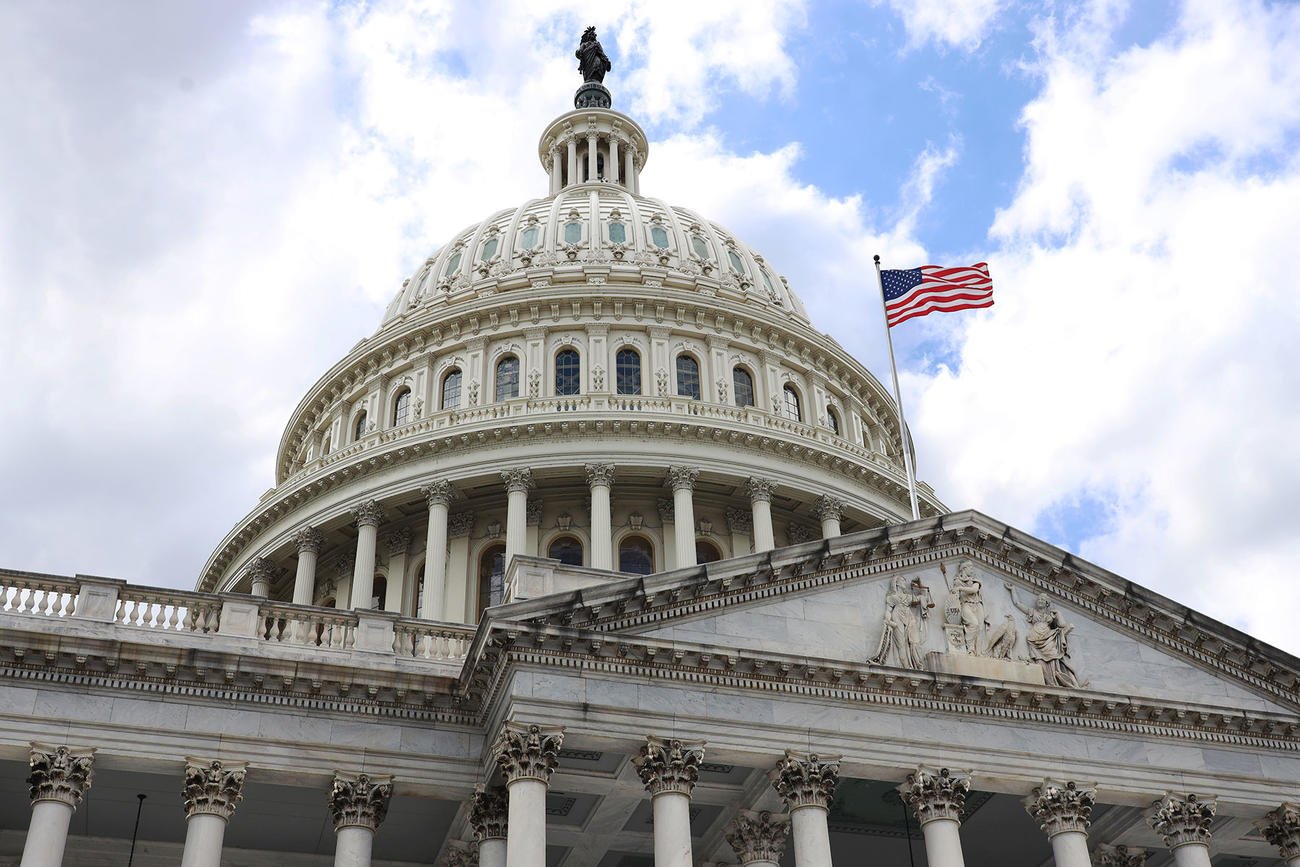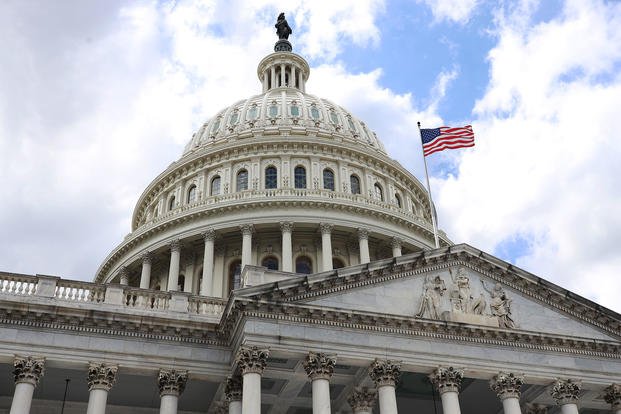

Bonuses to help low-paid service members cope with rising consumer prices are a step closer to reality after the House Armed Services Committee advanced its mammoth, must-pass defense policy bill containing the benefit.
The committee voted 57-1 early Thursday to approve its version of the National Defense Authorization Act, or NDAA, the sweeping annual bill that outlines the Pentagon budget and sets a wide range of defense policies. Rep. Ro Khanna, D-Calif., was the only “no” vote.
The 2.4% “inflation bonuses” would go to service members and Defense Department civilians making less than $45,000 annually. The bonuses would be paid in monthly installments throughout 2023. The bill also included significant policy shifts, including how prosecutions for sexual harassment will be handled, increased federal oversight of the National Guard, and the creation of a Space National Guard.
Read Next: 10 Months Later, Afghan Refugees Labor to Build New Lives in US
The inflation bonuses were included in a broader amendment to the NDAA that added $37 billion to the bill’s overall price tag, bringing the NDAA’s top-line dollar figure to roughly $840 billion.
The amendment was in part meant to address record inflation and also includes about $6 billion for inflation costs related to military construction and fuel.
“The inflationary pressures that are impacting economies worldwide are hampering our military’s ability to purchase new equipment, invest in emerging technologies, and adequately pay and support our greatest national security asset, our men and women in uniform,” Rep. Jared Golden, D-Maine, the amendment’s chief sponsor, said during committee debate.
But it would also authorize billions more than the Biden administration requested for more ships, planes and other military hardware.
The amendment was opposed by top Democrats, including committee Chairman Adam Smith, D-Wash., even though he said he thinks the amendment has “a lot of good things,” including “a lot of things in here that address inflation for our service members.”
“I’ve heard a lot of people say recently quantity has a quality all its own. I just want to be clear: No, it doesn’t,” Smith added about the amendment’s extra hardware. “That’s one of the dumbest damn things I’ve ever heard. If you have a hundred different things that are incapable of doing anything, you’re not better off if you’ve got 200.”
But 14 centrist Democrats sided with Republicans to support the amendment, and it passed the committee 42-17.
The bill must still pass the full House and be reconciled with the Senate version of the NDAA, which does not contain the inflation bonuses, before it becomes law.
The committee’s 16-hour debate on the NDAA also touched on several hotly debated issues, though some of the most controversial ones, such as abortion, were skirted. Here are some of the highlights:
Compassionate Reassignment
Democrats defeated an amendment from Rep. Matt Gaetz, R-Fla., that would have prohibited the military branches from allowing service members to move based on discriminatory local laws.
The amendment was spurred by a Military.com report that the Army is considering updating its so-called compassionate reassignment policy to allow service members to request a permanent change of station if they feel state or local laws discriminate against them based on gender, sex, religion, race or pregnancy.
“I stand for the proposition that our service members ought to be in the places that best provide for the national defense and that meet America’s needs,” Gaetz said after quoting from the Military.com article. His amendment would have barred permanent changes of station done for the “sole basis” that a service member “disagrees with a state or local law.”
The Army’s debate comes amid a wave of local anti-LGBTQ laws, as well as the expectation that the Supreme Court will soon overturn the Roe v. Wade precedent that ensures abortion is available nationwide. The conservative states with anti-LGBTQ laws and that are expected to outlaw abortion post-Roe are home to the biggest U.S. military bases.
In arguing against Gaetz’s amendment, Smith said Congress should let the Pentagon “decide where best to put its people for a variety of reasons.”
Sexual Harassment
As part of a package of noncontroversial amendments, the committee voted without debate to move sexual harassment prosecutions outside the chain of command.
Last year’s NDAA created independent prosecutors to handle sexual assault and some other related or serious crimes, rather than commanders. But in what Rep. Jackie Speier, D-Calif., previously called a “massive oversight,” sexual harassment was kept within the chain of command.
The amendment, which Speier earlier introduced as a stand-alone bill, would correct that. It also seeks to ensure investigations into sexual harassment allegations are independent by requiring investigators come from “outside the chain of command of the complainant and the subject of the investigation.”
Federal Oversight of National Guards
A couple amendments sought to give the federal government more oversight over state National Guards, though one prevailed and one was defeated in largely party-line votes.
The amendments come after reports on the difficulty National Guard members have had getting justice on sexual assault because of gaps between state and federal oversight, as well as reports of issues with a Texas-run National Guard mission on the U.S.-Mexico border.
The amendment that was approved would require federal inspections of state National Guards every five years to assess whether they are reporting and addressing sex-related offenses and sexual harassment, training in sexual assault prevention and response, and training in suicide prevention.
“I have seen some appalling cases come to my attention through, frankly, local newspapers where there just is no accountability,” said Speier, the amendment’s sponsor.
The other amendment, from Rep. Veronica Escobar, D-Texas, would have given the inspectors general for the Army, Navy and Air Force jurisdiction over any “organized militia of the United States.” Escobar said the amendment, which failed, was inspired by Texas Guardsmen “literally begging us for help.”
Republicans opposed the amendments, arguing they would encroach on states’ authority over their National Guards and violate the 10th Amendment that guarantees states powers that aren’t granted to the federal government in the Constitution.
Afghan Allies
The committee voted to expand the eligibility criteria for Afghans seeking visas to the United States.
Specifically, the amendment from Rep. Seth Moulton, D-Mass., would allow Afghans who worked with the U.S. military for less than a year because they were wounded to get Special Immigrant Visas, or SIVs. Right now, Afghans are eligible for SIVs only if they worked with the U.S. military for at least a year.
Advocates estimate tens of thousands of Afghans who helped the U.S. war effort were left behind after the United States fully withdrew from Afghanistan last summer. Meanwhile, the number of SIVs approved by the State Department has dropped dramatically since then.
The Armed Services Committee also approved an amendment that seeks to correct one of the reasons Afghans are often denied SIVs: the U.S. government’s scattered or lack of paperwork.
The amendment from Rep. Jason Crow, D-Colo., would create a centralized database at the Defense Department of foreign nationals who work with the U.S. government or a contractor in a war zone. Rep. Mike Turner, R-Ohio, argued such a database could “get people killed,” but the amendment was adopted 33-25.
Marijuana Policy
Lawmakers want the military to take a look at how it sentences service members convicted of marijuana-related offenses.
The committee approved in a voice vote an amendment from Rep. Anthony Brown, D-Md., to require a Military Justice Review Panel to recommend new sentencing guidelines for possessing and using marijuana, with a consideration for how marijuana-related sentences compare to “other comparable offenses, such as offenses involving the misuse of alcohol.”
At least 38 states and Washington, D.C., allow marijuana use either recreationally or medically. But marijuana is still illegal federally and in the military, often leading to harsh punishments for service members caught with it in their system.
“My amendment doesn’t change current law, but what it does do is require our armed services to review and provide recommendations for potential reform,” Brown said in a statement after his amendment was adopted. “This is an important step in our efforts to ensure our military justice system is providing fair treatment to every servicemember.”
Space National Guard
Lawmakers are reviving the fight over creating a Space National Guard.
With no debate, the committee approved an amendment to create a Space National Guard as part of a larger package of amendments considered noncontroversial by panel members.
The same amendment was included in last year’s initial House version of the NDAA. But it wasn’t in last year’s initial Senate version, and it got stripped from the final version that was signed into law amid opposition from the White House, which argued a Space National Guard would create another layer of bureaucracy.
The Department of the Air Force has since proposed “part-time” Guardians instead of a Space National Guard, but Guard leaders have voiced concerns about that idea.
This year’s Senate version of the NDAA again does not have a similar provision, but several senators have introduced a stand-alone bill to create a Space National Guard.
Vaccine Mandate
Several GOP efforts to weaken or entirely eliminate the COVID-19 vaccine requirement for service members were defeated by the committee’s Democratic majority.
Among the defeated Republican proposals was one that would have required the Pentagon to lift the vaccine mandate, or else the waiver that allowed Defense Secretary Lloyd Austin to bypass a law barring recently retired generals from leading the Pentagon would have been repealed.
Republicans also proposed allowing service members who have had COVID-19 to claim “natural immunity” to avoid getting the vaccine, as well as a couple of nonbinding “sense of Congress” measures that service members discharged for refusing the vaccine should be reinstated and that the process for requesting religious exemptions should change. Republicans also sought to allow service academy cadets and midshipmen who refuse the vaccine to still commission as officers, as well as exempt them from having to pay back their taxpayer-funded education when they aren’t commissioned because of vaccine refusal.
Republicans did get two minor victories related to the vaccine mandate. Last year’s NDAA ensured troops will get no less than a general discharge under honorable conditions for refusing the vaccine, but only through 2023. The House Armed Services Committee approved in a voice vote an amendment that would eliminate the time limit.
The committee also approved in a voice vote an amendment to prevent the Defense Department from enforcing a vaccine mandate for contractors until the Government Accountability Office studies what the effect of a mandate on contractors would be. The amendment is moot at the moment, since courts have already blocked the Biden administration’s vaccine mandate for federal contractors from taking effect.
— Rebecca Kheel can be reached at [email protected]. Follow her on Twitter @reporterkheel.
Related: Troops Making Less than $45,000 Would Get ‘Inflation Bonus’ Under House Proposal
© Copyright 2022 Military.com. All rights reserved. This material may not be published, broadcast, rewritten or redistributed.
